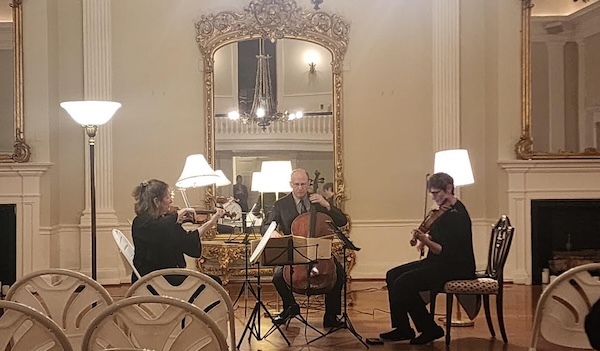Concert Review: The Boston Artists Ensemble Plumb the Hidden Depths of Mozart
By Aaron Keebaugh
When performed with this high level of polish and poise, even Mozart’s darkest music can make you smile.

The Boston Artists Ensemble in rehearsal at Salem’s Hamilton Hall. Photo: Julianne Lee
Many musical works bear dedications that honor individuals who held prestigious positions or completed exemplary deeds of service. But, in some instances, the name reflects someone who soothed a composer’s pain during a time of personal troubles. In the case of his Divertimento in E-flat, K. 536, Mozart paid gratitude to Michael Puchberg, a fellow Freemason who lent the composer a vast sum of money during a time of significant difficulty.
Accordingly, the music Mozart wrote was as luxurious as the amount received via a series of loans, ranging in size from 30 to 300 florins, and totalling about 1400 florins. Being out of debt brought with it an air of creative freedom. The music pushes against the conventional boundaries of genre.
Mozart scored the Divertimento for string trio, an assemblage that is so lean that composers usually scramble to thicken the musical texture. There’s no struggle to add richness here. In fact, the threads here are dense, mystifying. The strings slip in and out of closely related keys in ways that sound surprising today. And, when played with the gusto that the Boston Artists Ensemble brought to the piece at Hamilton Hall in Salem this past weekend, the Divertimento sounds as if it could have come from an entirely different era.
At the time, Divertimentos were light-hearted affairs, more about entertainment than profound expression. But Mozart’s Divertimento in E-flat broke new ground on multiple fronts. The dexterous arrangement imbues the music with an intimacy that never wears out its welcome across its 45-minute span. The musicians explore a wide sweep of emotions, feelings change with startling quickness. Despite its general mode of tranquility, Mozart’s score, as played by the BAE, casts as much dusky ambiance as the music of Alexander Von Zemlinsky, or even the early efforts of Arnold Schoenberg.
Violist Tatiana Dimitriades, violist Rebecca Gitter, and cellist Jonathan Miller achieved such fin-de-siecle gravitas by imbuing the opening movements with grainy warmth. That weight still left room for playfulness as silvery tones in the strings’ upper register tipped the music momentarily towards the light.
The Andante shimmered, despite fitful lapses in intonation. But, with the Menuettos, the players’ tonal blend hit the right balance, even as the players dug in with seismic fury. Heavy downbeats enabled this spirited dance to lift gracefully. And the second Menuetto flowed gleefully, even given its statelier pace.
Mozart’s debt to Haydn shone clearly in the Andante’s theme and variations, where the performers let the music beam brightly, energized by the requisite wit and vitality. They did the same with the final Allegro, a musical conversation driven by fun and good cheer.
The second half of the concert centered on Mozart’s String Quartet in D minor, K. 563 and it explored greater turbulence. The only one of Mozart’s “Haydn Quartets” to be scored in a minor key, the D minor quartet bears all the angst and darkness that its key implies.
Joined by first violinist Julianne Lee, the BAE evoked haunting lyricism straight from the opening bars. Dimitriades, Gitter, and Miller supplied an ample surface on which Lee could spin sparkly lines and elegant arpeggios. But these performers just as nimbly leaned into the passages of wayward tension, episodes that revealed this to be another work where Mozart tested the boundaries of convention.
Such an effect could be felt even in the rosy and radiant harmonies of the Andante as well as in the force and power exerted by the Menuetto, where raspy sonorities looked ahead to late-nineteenth-century decadence. Generous rubato also teased out the pent-up anxieties etched into the finale. That said, the limpid textures hinted at hidden charm. When performed with this high level of polish and poise, even Mozart’s darkest music can make you smile.
Aaron Keebaugh has been a classical music critic in Boston since 2012. His work has been featured in the Musical Times, Corymbus, Boston Classical Review, Early Music America, and BBC Radio 3. A musicologist, he teaches at North Shore Community College in both Danvers and Lynn.
Tagged: Boston Artists Ensemble, Jonathan Miller, violist Rebecca Gitter
